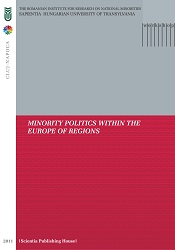Constitutional Preferences, National Identity and Electoral Behaviour: The Three Circles of Nationalism
Constitutional Preferences, National Identity and Electoral Behaviour: The Three Circles of Nationalism
Author(s): Ivan Serrano
Subject(s): Politics / Political Sciences
Published by: Scientia Kiadó
Keywords: Catalonia; national identity; constitutional preferences; electoral behaviour;self-government; dual identities
Summary/Abstract: Based on two recent surveys conducted in 2008 and 2009, this paper analyses the relation between national identity, constitutional preferences, and electoral behaviour in Catalonia. A reasonable starting hypothesis could expect the existence of a strong relation between support to independence, feelings of exclusive identity, and vote for nationalist parties. According to this ‘congruence hypothesis’, these three particular positions could be represented as almost perfectly overlapping spheres – the three circles of nationalism. However, different studies have suggested that such a clear relation does not exist. Rather to the contrary, complex and multifaceted relations are the norm. Furthermore, in the case of Catalonia, constitutional preferences have been usually approached by a four-grade scale of self-government (‘region’, ‘autonomous community’, ‘state within a federal Spain’, and ‘independent state’), but relatively little work has addressed them in terms of support or opposition to an independence referendum. The paper will present some evidence on the relation between national identity and electoral behaviour with regard to constitutional preferences in both dimensions, the four-grade scale of self-government, and the referendum question. Based on the results of this twofold analysis, a number of issues will be discussed from the extent to which the ‘hypothesis of congruence’ is a useful tool to interpret the Catalan case to the limits of well-established contributions that emphasise the importance of the so called ‘dual identities’ in order to explain the varying levels of support to the different constitutional options. This complementary approach can contribute to understand why, far from fulfilling certain expectations of a non-conflictive accommodation within a decentralised state, the question of self-government has remained an important element in the political agenda of Catalan and Spanish politics.
Book: MINORITY POLITICS WITHIN THE EUROPE OF REGIONS
- Page Range: 87-105
- Page Count: 19
- Publication Year: 2011
- Language: English
- Content File-PDF

